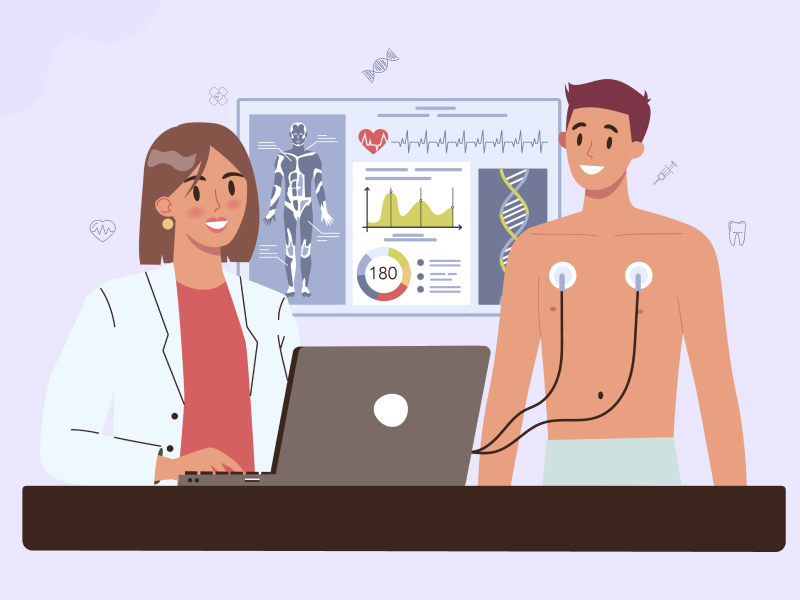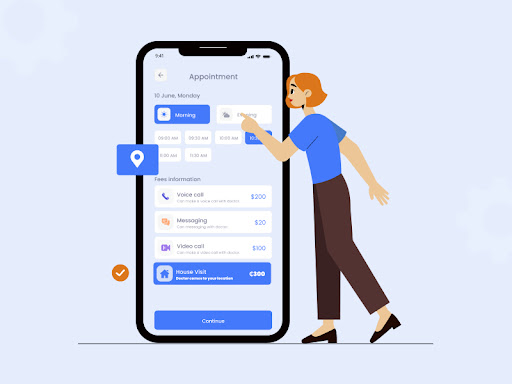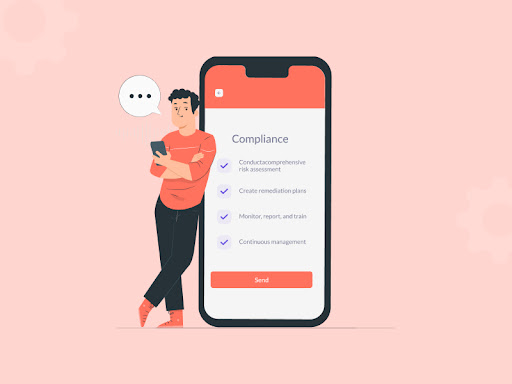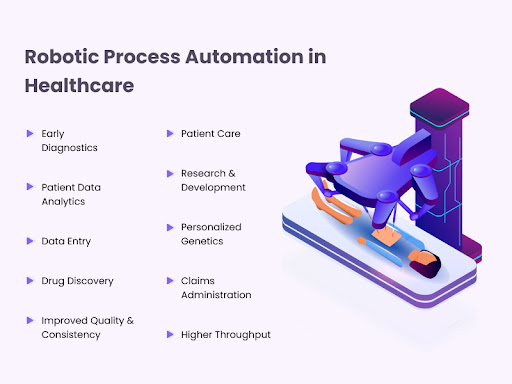Businesses across industries are increasingly turning to robotic process automation (RPA) solutions to streamline operations and cut costs, and healthcare is no exception. The industry is leveraging the business process automation technology to address some of its most burdensome issues, make its systems efficient, processes faster, and provide better patient care.
With the help of RPA software, healthcare providers are developing intelligent automation that can handle repetitive tasks like data entry and ensure consistency across the entire organization so that skilled workers can do more valuable work.
Let’s look at some of the applications and use cases of RPA in the healthcare industry that can streamline healthcare and improve patient care.
Table of Contents
RPA Applications in Healthcare
Robotic Process Automation is deployed in various industries, including healthcare, to automate complex, rule-based processes. The technology is well suited for repetitive and time-consuming tasks, where accuracy is critical. Healthcare is one industry that is beginning to reap the benefits of RPA.
For instance, RPA can be used to automate insurance claims processing. This includes verifying patient information, checking eligibility, and calculating benefits. By automating these processes, the AI-based technology can speed up claims processing and free up staff for other tasks.
The automation technology applications are also useful in streamlining the appointment scheduling process and performing tasks such as verifying coverage, checking availability, and sending reminders with little or no human intervention.
Also Read: RPA in Banking: Benefits, Use-Cases, and Steps to Deploy
Use Cases of RPA in Healthcare
Patient Appointment Scheduling
Patients can book appointments online for many hospitals and individual doctors nowadays. However, processing these bookings is still a manual task often performed by an administrator. Manual appointments may lead to chaos when there are multiple consultations and some cancellation and modification requests.
Also, appointment scheduling should be accurate when it comes to patient care. A doctor must be available at the scheduled appointment, and the patient should be informed well in advance if there is any change.
Benefits of Using RPA software
RPA bots, developed by healthcare software development services, can automatically manage appointment requests and schedule, update, and cancel them if required or desired. The following is the automated workflow of AI-powered RPA bots:
- Appointment slots are offered to a patient according to their requests and the availability of a doctor.
- After the patient has scheduled an appointment, it gets stored in the database and marks that appointment slot as unavailable.
- The patient receives appointment details by email or text message.
Compliance Check
RPA in healthcare makes tracking and documenting each step in structured log files and helps hospitals comply with external audits. As these processes are automated and handled by bots, the data confidentiality of the institute is also improved.
Non-compliance with regulations can lead to 30 to 40% of health insurance claims rejection. Therefore, a resilient compliance process becomes necessary to document and monitor each process step at every insurance claim stage and allow healthcare providers and insurance companies to process claims. With the application of RPA bots, these processes also enhance the confidentiality of data.
Benefits of Using RPA software
Bots ensure higher transparency by creating and storing event logs of each step in the process. The following actions are the tasks managed by AI-powered bots:
- Eliminate or minimize the time spent collecting, compiling, detecting, and correcting inaccurate data from an extensive database.
- Automate and perform pre-compliance check internal audits to spot non-compliant processes.
- Quickly access and extract data from audit trails at any time.
Watch this Video – https://www.youtube.com/watch?v=BPCeLMLLfIM
Claim Management
After billing and compliance are taken care of, RPA in healthcare can also help automate claims processing by speeding up the entire process and improving accuracy. The automation technology based on artificial intelligence streamlines billing. The RPA-led claims management system eliminates errors made by administrators during claim processing.
Benefits of Using RPA Software:
Healthcare providers hire AI developers to build AI-powered bots that automatically manage the billing and claim processes in line with medical services given to a patient. Here is how you can leverage bots to streamline billing and minimize human intervention:
- Identify which tasks in the claims process can be automated.
- Select the right RPA software for your needs.
- Train your staff on how to use the software and streamline your claim management process.
Discharge Instructions
A medication and healthcare regimen should be followed when a patient is discharged from a hospital after receiving medical assistance. Some patients, however, forget the details or simply miss the date of a specific procedure required.
RPA bots can be used for sending reminders. By automating this process, healthcare providers can ensure that patients don’t miss their appointments and that the appointment turnaround is increased. Along with the discharge process, the use of RPA can also optimize patient admission and help offer higher levels of customer service.
Benefits of Using RPA Software:
RPA bots built by expert healthcare software development services or AI developers can add value to healthcare providers and patients. For example:
- Patients receive emails or text messages about their discharge and post-medication guidelines.
- The AI-powered bots send regular and timely notifications to patients about their schedules, appointments, and required tests as per the recovery plan suggested by their doctors.
Data Entry
Many hospitals in different parts of the world still rely heavily on their staff for paper documentation. That makes the industry error-prone and impacts functionality. RPA bots can digitize the process of data entry, migration, and extraction. Healthcare providers are now shifting to digitizing patient information and storing them electronically for easy and quick access.
Benefits of Using RPA Software:
AI-powered RPA software can be both time and cost-effective. For example:
- The cost of RPA software is often significantly less than the resources hired to perform manual tasks.
- It can effortlessly record and monitor a large volume of data.
- Hospitals and clinics can deliver apt diagnostic tests and well-customized treatments.
Managing Healthcare Workflows
Managing a healthcare institution requires coordinating and handling healthcare, case and utilization management, monitoring patients from remote locations, and various other workflows. These workflows often contain routine tasks and responsibilities that are crucial for healthcare providers and patients. Hospitals and clinics generally have multiple staff to manage tasks manually, which, being an inefficient approach, can be prone to errors.
Healthcare providers can employ robots in place of humans to handle workflow management. RPA can manage the healthcare industry and centralize and streamline different tasks with cost-effective and accurate results. AI-powered bots show their competency in handling complex, rule-based processes. Therefore, the hospitals and clinics that have already implemented the RPA process have significantly improved their efficiency.
With tasks, as mentioned above, taken care of by Robots, a doctor and other healthcare professionals can focus more on patients and other critical activities that require manual intervention, resulting in improved customer service.
Benefits of Using RPA Software:
Healthcare providers can use RPA in healthcare to manage their workflow and operations. RPA-based software solutions offer a host of features that can be used to automate various tasks, processes, and workflows. Here are some examples:
- Online appointment scheduling
- Patient check-in and check-out
- Medical records management
- Laboratory test results management
Remote Consultation and Care
Since the outbreak of COVID-19, many patients are avoiding visiting hospitals and clinics to prevent the risk of getting infected. However, this may cause them to miss their regular health checkups and doctor appointments. COVID-19 pandemic guidelines such as maintaining social distance, using masks, and washing hands frequently are, to some extent, curbing the virus, but they aren’t foolproof.
AI-powered RPA and bots can offer respite in the time of the pandemic by automating repetitive customer service and remote care activity. The bots can address repetitive questions with consistency and effectiveness. As discussed above, RPA can also help follow-up for remote care, following industry guidelines to deliver specific communication at required steps in the patient care plan.
Benefits of Using RPA Software:
With the outbreak of COVID-19, RPA in healthcare has become vital for providing remote consultation to patients. It can be used to set up virtual waiting rooms, where patients can consult with their doctors without physically being present in the hospital. AI-powered bots can virtually help hospitals manage their entire waiting list without human intervention. Healthcare providers no longer have to worry about managing a physical space for patients. RPA bots can:
- Easily add or remove patients from the waiting list.
- Send notifications to patients about their turn.
- Update patient records in the system automatically.
Communications
RPA in the healthcare sector can be used to automate communications. The bots can be the first point of contact for patients, answer their generic inquiries on the website, escalate concerns to appropriate departments, and send emails to patients, vendors and staff.
Benefits of Using RPA software:
In a healthcare setup, it’s vital to maintain constant and seamless communication with patients for follow-ups and provide them with updates about their health. If a hospital or clinic has to serve and manage a large number of patients, it becomes difficult for them to manage one-to-one communication with each patient. Here, RPA plays a crucial role in this regard:
- Sending reminders for medicine intake
- Dietary recommendations
- Appointment scheduling for regular checkups
- Updates about new health concerns, etc.
Conclusion
The healthcare industry operates in real-time with almost no room for delay and errors. Also, healthcare professionals manually perform numerous administrative activities in the healthcare industry. While ensuring that health care tasks are not compromised, hospital and clinic staff also have to make sure they follow the rapidly evolving healthcare laws and regulations.
With the evolution of robotic process automation, a shift has been witnessed in the healthcare industry. By implementing innovative technology, healthcare professionals can provide personalized care while keeping the cost low and improving the overall quality of care. The inclusion of the technology also ensures maximum compliance with the laws and regulations and reduces the chances of errors.
RPA in healthcare can add value to healthcare providers and patients by reducing errors, improving accuracy, and saving time and money. RPA technology is thus poised to transform the healthcare industry for the better.
FAQs
1. What is RPA in Healthcare?
RPA in healthcare refers to software to automate and streamline various processes, from billing and claims management to discharge instructions and data entry. RPA bots can add value to healthcare providers and patients by reducing errors, improving accuracy, and saving time and money.
2. How can RPA Technology Transform the Healthcare Industry?
RPA technology is poised to transform the healthcare industry for the better by automating and streamlining various processes, from billing and claims management to discharge instructions and data entry. RPA bots help healthcare providers and patients by minimizing errors, improving accuracy, and saving time and money.
3. What are Some Common RPA Use Cases in Healthcare?
Healthcare providers often have sensitive interactions with patients, and some may be unnecessarily time-consuming, repetitive, and administration-related tasks that don’t require experts. RPA bots thus can be used for billing and claims management, remote consultation and care, discharge instructions, data entry, and more.
4. What are Some RPA Applications in Healthcare?
Some RPA applications in healthcare include automating and streamlining various processes, from billing and claims management to discharge instructions and data entry. RPA bots can provide added value to both healthcare providers and patients by reducing errors, improving accuracy, and saving time and money. RPA technology is thus poised to transform the healthcare industry for the better.
5. How can RPA Bots Provide Added Value to Healthcare Providers and Patients?
RPA bots can provide added value to healthcare providers and patients by reducing errors, improving accuracy, and saving time and money. RPA technology is thus poised to transform the healthcare industry for the better.









